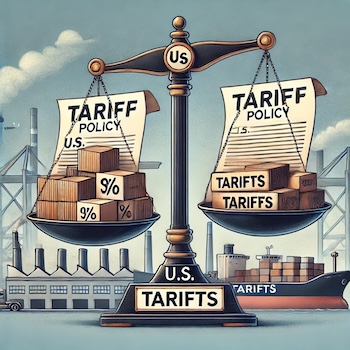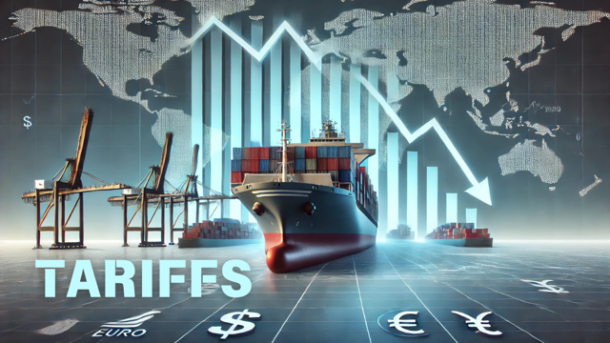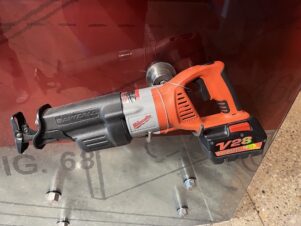 There has been some tough rhetoric coming out of president-elect Trump’s camp regarding tightening the screws on imported goods by implementing a hefty tariff on countries such as China, Mexico and Canada, to name a few. Is this a good attempt to bring more manufacturing stateside? How will this affect the economy? Is this even a good idea? We talk to some industry leaders about tariffs and what it means for the U.S. economy moving forward.
There has been some tough rhetoric coming out of president-elect Trump’s camp regarding tightening the screws on imported goods by implementing a hefty tariff on countries such as China, Mexico and Canada, to name a few. Is this a good attempt to bring more manufacturing stateside? How will this affect the economy? Is this even a good idea? We talk to some industry leaders about tariffs and what it means for the U.S. economy moving forward.
Recently, on the Crosstalk episode of the Make Trades Great Again and Appetite for Construction podcasts, this very topic came up and Andy Mickelson, Mickelson Plumbing and Heating, Missoula, Mont., and Eric Aune, Aune Plumbing, Zimmerman, Minn., were in unison in their view on tariffs. “There will be an impact,” says Mickelson. “Every single item that we touch has some impact from an imported product or good. And to sit back and believe that it’s not going to have a day-to-day impact or a cost increase is foolish.”
“It’s a tax that’s going to kill sales; it’s definitely going to affect us moving forward, especially if we see higher tariffs,” says Aune.
Mickelson continues, “There’s going to be a ‘trickle up’ effect, and along with that we’re going to see a lack of material … we saw brief chunk of this in 2021 when we had the port issues and shipping problems, and you extrapolate that into that into that these items aren’t coming because they are too expensive, how do you get around that? You can’t just flip a switch and just say we’re just going to make it here. We’re not ready for that, and I don’t think that this country is ready to become a manufacturing country. I don’t think there enough people who are willing to work on the assembly line … we can’t get people to sign up right now to become a plumber or an electrician or a data communication person—any of those manufacturing-type jobs are very much so in line with what it means to go out and work with your hands, be in a skilled trade.”

So, the back-and-forth debate continues to brew relating to whether instituting tariffs is beneficial to the American economy and the American worker. Dain Hansen, Executive Vice President, Government Relations, The IAPMO Group, says that economists have different views on the topic of tariffs, but the plumbing industry is well-positioned to support continued domestic production of what our country needs—and increase U.S. exports to other countries.
“Any policy that strengthens our manufacturing muscle is good for the economy and increases job opportunities in the trades. Programs such as the Market Development Cooperator Program and Standards Alliance at USAID, along with the Department of Commerce’s Foreign Commercial Service, provide vital support to U.S. exporters. We hope the administration will continue backing these programs to ensure U.S. products remain competitive overseas. We continue to monitor the impact tariffs are having on our global industry as manufacturing move locations to avoid these costs,” says Hansen.
While IAPMO is cautiously optimistic and vigilant, Plumbing Manufacturers International (PMI) shares concern. “During his campaign, President Trump spoke about his desire to increase tariffs—as high as 60% on Chinese goods, 10% to 20% across the board on all foreign goods, including Europe, and 25% on imports from Mexico, unless they curb the number of immigrants coming across the border. If he’s successful, these tariffs will have an inflationary impact, increasing the costs of production and in turn the costs of products in the marketplace. That’s certainly one of the biggest concerns plumbing manufacturers have right now.
“Our stance on this issue all along is that tariffs are harmful to the economy because they increase costs for manufacturers and have an inflationary impact on customers wishing to purchase plumbing products. These increased costs lead manufacturers to provide fewer jobs and they have less money for compensation as well. From an economic standpoint, we see no benefits from tariffs. PMI has always been an advocate for free and fair trade among nations,” says Kerry Stackpole, CEO and Executive Director, PMI.
According to Ben Brubeck, Vice President of Regulatory Labor and State Affairs, Associated Builders and Contractors (ABC), tariffs are a negotiating tool to renegotiate policies with other countries. “While having a hard time getting materials from overseas, resolving the domestic supply chain is a good thing.”



